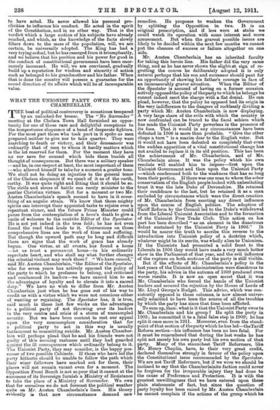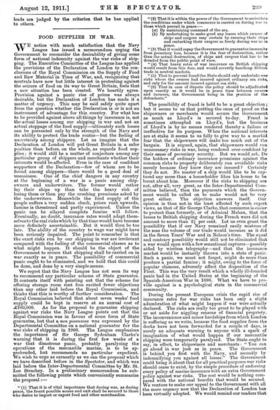WHAT THE UNIONIST PARTY OWES TO MR. CHAMBERLAIN. T HE heat
of political controversy is sometimes tempered by an unlooked-for breeze. The " No Surrender " meeting at the Chelsea Town Hall furnished an oppor- tunity for one of these rare and delightful exceptions to the tempestuous eloquence of a band of desperate fighters. For the most part those who took part in it spoke as men prepared neither to give nor to take quarter. They were marching to death or victory, and their demeanour was ordinarily that of men to whom it hardly matters which is the lot reserved for them. For the moment they have no ear save for counsel which bids them banish all thought of consequences. But there was a solitary speaker —and he, in one respect at least, the most important of them —who allowed himself to take for a moment a gentler tone. We shall not be doing an injustice to the general tenor of the Chelsea eloquence if we speak- of it as of the earth, earthy. It was quite right and fitting that it should be so. The strife and stress of battle can rarely minister to the gentler Christian virtues. But for a moment or two Mr. Austen Chamberlain's speech seemed to have in it some- thing of an angelic strain. We know that those mighty spirits can interrupt their appointed tasks to rejoice over a repentant sinner, and the future Prime Minister could pause from the contemplation of a hero's death to give a smile of welcome to the contrite Editor of the Spectator. He is not yet indeed in the true fold; he has not even found the road that leads to it. Conversions on those comprehensive lines are the work of time and suffering. But though the upward path may be long and difficult there are signs that the work of grace has already begun. One virtue, at all events, has found a home —let us trust a permanent home—in his ordinarily reprobate heart, and who shall say what further changes the celestial visitant may work there ? " We have caused," said Mr. Austen Chamberlain, "the Editor of the Spectator, who for seven years has actively opposed the policy of the party to which he professes to belong, and criticized and condemned its leaders—we have caused him to see the advantages of loyalty and to elevate it into a sacred duty." We have no wish to differ from Mr. Austen Chamberlain just when he has gone out of his way to credit us with a virtue which we were not conscious either of wanting or regaining. The Spectator has, it is true, said much in these last few weeks on the advantages to a political party of not throwing over its leaders in the very centre and crisis of a storm of unexampled severity. But we have been content to rest our appeal upon the very commonplace consideration that for a political party to act in this way is usually tantamount to committing suicide. Mr. Austen Chamber- lain will perhaps plead that he and his friends were not guilty of this seeming rashness until they had guarded against the ill consequences which ordinarily belong to it. The Unionist Party, they may consider, is the happy pos- sessor of two possible Cabinets. If those who have led the party hitherto should be unable to follow the path which their wiser followers have marked out for them, their places will not remain vacant even for a moment. The Opposition Front Bench is not so poor that it cannot at the summons of its Sovereign furnish a Ministry of Resistance to take the place of a Ministry of Surrender. We own that for ourselves we do not forecast the political weather quite on Mr. Austen Chamberlain's lines. His theory evidently is that new circumstances demand new remedies. He proposes to weaken the Government by splitting the Opposition in two. It is an original prescription, and if less were at stake we could watch its operation with some interest and more amusement. But when the gravest possible issues are likely to be decided within the next few months we cannot put the chances of success or failure altogether on one side.
Mr. Austen Chamberlain has an inherited faculty for taking this heroic line. His father did the very same thing, and as he has never shown the slightest sign of re- gretting the course he deliberately adopted it is only natural perhaps that his son and successor should pant for an opportunity of showing his father's courage in face of an immeasurably graver situation. When the Editor of the Spectator is accused of having on a former occasion actively opposedthe policy of the party to which he belongs he cannot indeed meet the charge with a, flat denial He can plead, however, that the policy he opposed had its origin in the very indifference to the danffers of recklessly dividing a Chamberlain which Mr. Austen Chaherlain is now displaying.
A very large share of the evils with which the country is now confronted can be traced to the fiscal schism which has made the Unionist Party powerless in the presence of its foes. That it would in any circumstances have been defeated in 1906 is more than probable. " Give the other chaps a turn " is a maxim dear to the English voter. But it, would not have been defeated so completely that even the sudden apparition of a vital constitutional change has not availed to replace it in its old position. This has been the achievement of Mr. Chamberlain, and of Mr.
Chamberlain alone. It was the policy which his own resolute will enabled him to impose—first upon the Unionist Government and then upon the Unionist Party —which condemned both to the weakness that has so lone, been their portion. If there was one man to whom the sober conservatism of the English people looked with unhesitating trust it was the late Duke of Devonshire. He retained their confidence to the last, but he retained it as a man excluded by circumstances which were the direct creation of Mr. Chamberlain from exerting any direct influence upon the course of English politics. The adoption of Tariff Reform by the Council led to the Duke's withdrawal from the Liberal Unionist Association and to the formation of the Unionist Free Trade Club. This action on his part has been described " as an element in the disastrous defeat sustained by the Unionist Party in 1906." It would be nearer the truth to ascribe this reverse to the introduction into Unionist policy of a doctrine which, whatever might be its merits, was wholly alien to Unionism. If the Unionists had presented a solid front to the Liberals in 1906 they would have made a very much better show in the Parliament of that year, and the evil influence of the rupture on both sections of the party is still visible.
But if the effects of Mr. Chamberlain's policy in the last years of the Unionist administration were disastrous to the party, his advice in the autumn of 1909 produced even worse results. It is now an open secret that it was Mr. Chamberlain who forced the hands of the Unionist leaders and secured the rejection by the House of Lords of Mr. Lloyd George's Budget. This advice, which was con- sistently opposed in these columns, is now almost univer- sally admitted to have been the source of all the troubles by which the party has since that time been afflicted.
To sum up, then : what is it that the Unionist Party owes to Mr. Chamberlain and his group ? He split the party in 1903 ; he committed it to a fatal false step in 1909; he has split it once more in 1911. Moreover, even from the stand- point of that section of the party which he has led—the Tariff Reform section—his influence has been no less fatal. For it must be remembered that during the last weeks he has split not merely his own party but his own section of that party. Many of the staunchest Tariff Reformers, like Mr. Henry Chaplin, have, to their very great credit, declared themselves strongly in favour of the policy upon the Constitutional issue recommended by the Spectator. We are not Tariff Reformers, but if we were we should be inclined to say that the Chamberlainite faction could never be forgiven for the irreparable injury they had done to the cause of Preference and Protection. It is with the greatest unwillingness that we have entered upon these plain statements of fact, but since the question of party loyalty has been raised by Mr. Austen Chamberlain he cannot complain if the actions of the group which he leads are judged by the criterion that he has applied to others.



































 Previous page
Previous page